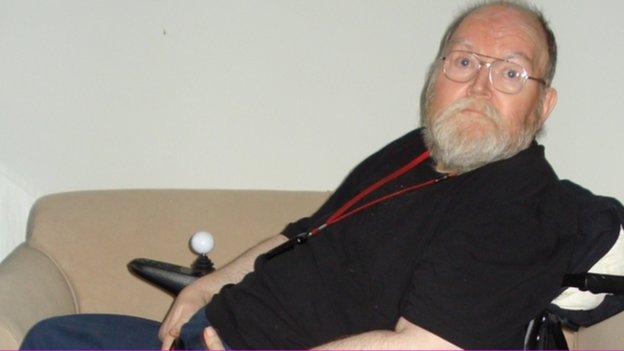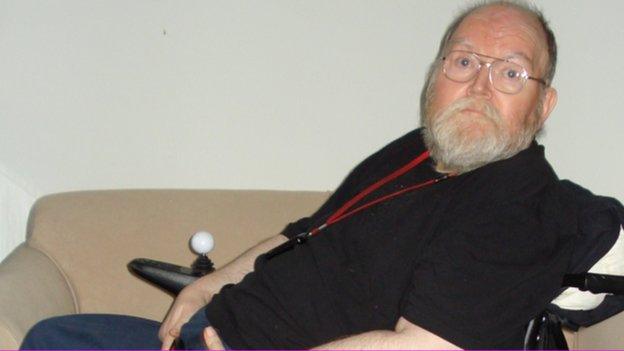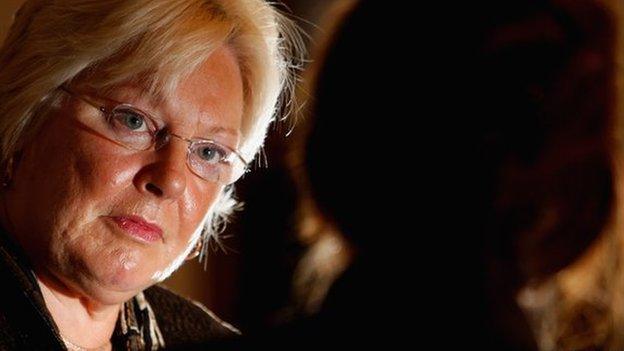Right to die campaigner Gordon Ross: 'If the time comes, I will need help'
- Published

Former TV producer Gordon Ross needs help for all his personal needs
Gordon Ross is quite clear: he does not want to die.
As a committed nationalist, he says he is looking forward to the Holyrood election in 2016 and possibly a further independence referendum.
But he knows he may not see that happening.
The 66-year-old grandfather lives in a care home on the south side of Glasgow, where his disabilities mean he requires help for all of his personal needs - including feeding and drinking.
He suffers from Parkinson's disease, which gives him violent shaking fits, leaving him weak and exhausted.
He also has a condition which has damaged his nervous system, meaning he has no feeling in his hands or feet.
'Very sore'
This means he cannot stand, and must drink from a straw in a plastic bottle. He crushed a glass in his fingers, because he was unable to gauge how strongly he should grip it.
He did not wish to film an interview because he was feeling ill, but spoke frankly to BBC Scotland about his condition.
"I shake very badly; an attack can last at least a quarter of an hour and it is very sore," he said.
"Afterwards I am left dripping in sweat and shattered.
"I know my condition is deteriorating, but I am hoping I am getting to a plateau so things can be more stable for a while."
Mr Ross, a former television producer who also worked as a care home inspector, says his disability means he could not now take his own life should he want to - although he constantly emphasises that he wishes to continue living.
But he argues he has lost the choice an able-bodied person has - and he had himself until a few months ago.
"If I wanted to end my life because my condition has become unbearable, I would require help to do so," he said.
'Need help'
"But anyone who helped me could face prosecution. This discriminates against me as a disabled person.
"A younger person could take the decision to end their life. I could have done so a couple of years ago. But I didn't want to then, and I don't now.
"But if the time comes, I will need help."
He said he wanted to be able to attend the Judicial Review case at the Court of Session in person.
But after a test run in a taxi to see if he could cope with the journey from Glasgow, they turned back.
In the case he hopes to force the Lord Advocate, Scotland's senior prosecutor, to issue guidance, similar to that in England and Wales, external which means a person assisting in a suicide "for altruistic reasons" will not face prosecution.
That guidance was issued after a case at the UK Supreme Court, external which upheld a ban on doctors helping patients to end their lives, but ruled that judges do have the "constitutional authority" to intervene in the debate.
'Deliberate killing'
The ruling challenged parliament to re-examine the predicament of those who are severely ill and wish to die but cannot do so without medical assistance.
MSPs are currently debating a bill which was brought forward by the late independent MSP Margo Macdonald.
The Lord Advocate, Frank Mulholland QC declined to give evidence to Holyrood's health committee in January 2015 because the judicial review was pending.
But in a letter to MSPs, he outlined the legal position. He said: "If someone assists another to take their own life, such cases would be reported to the procurator fiscal as a deliberate killing of another, and it would be dealt with under the law relating to homicide."
He went on: "There is a high public interest in prosecuting all aspects of homicide where there is sufficient available evidence."
There is opposition at Holyrood to the Bill, external but Gordon Ross said even if it went ahead, it might be too late for him.
"That's why I need a decision quickly, and why this court case is so important," he said.
- Published14 May 2015

- Published4 June 2014
